Every Oscars season brings new surprises: first-time nominees, snubbed Hollywood veterans, a list of honorees spanning blockbusters to indies. But one kind of movie is always a contender: the biopic. A true-story film is one of the most reliable forms of awards catnip; seven of the past 10 winners for Best Actor in a Leading Role were nominated for their portrayal of a real figure, sometimes a well-known celebrity, such as Freddie Mercury or Winston Churchill. The movies housing those performances tend to be functional to a fault. But some biographical films break the form and attempt something artistically challenging while also telling their protagonist’s story. Here are 20 of my favorites.
Tick, Tick … Boom! (2021, directed by Lin-Manuel Miranda)
Jonathan Larson’s musical Tick, Tick … Boom! was autobiographical when he first performed it in 1990. But the version that Miranda brought to screens more than 30 years later is even less coy about the fact that the central Jon character is Larson, while conceding that the story depicted is true “except for the parts Jonathan made up.” Tick, Tick … Boom! is about Larson (played by Andrew Garfield) striving to break out in New York’s theater scene, but it’s more broadly a work about the tricky act of balancing ambition and sanity in the arts world. The film acknowledges that Larson tragically died before receiving wide recognition for his musical Rent, but that’s part of what makes Tick, Tick … Boom! such a compelling watch: Miranda pairs that sad awareness with the vibrant, yearning energy of Larson’s original text.
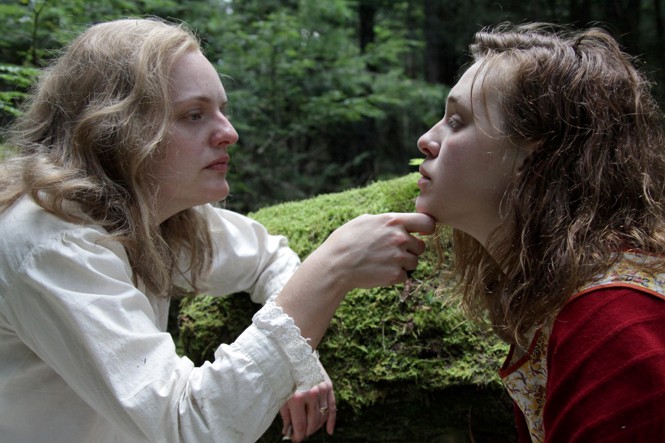
Shirley (2020, directed by Josephine Decker)
Another biopic that mixes fiction with fact, Shirley is a portrait of the author Shirley Jackson (Elisabeth Moss), set around the time she was writing her second novel, Hangsaman, published in 1951. Decker’s dreamy film sees a married couple arrive at Bennington College and get sucked into Jackson’s tempestuous relationship with her preening husband, Stanley Hyman (Michael Stuhlbarg); together, the two writers are an entrancing nightmare—Shirley’s alcoholism and agoraphobia clash with Stanley’s philandering and social pomposity. Moss’s performance is particularly energetic and raw, representing both the haunted nature of Jackson’s storytelling and the author’s own troubled life.
A Hidden Life (2019, directed by Terrence Malick)
After several years spent working on abstract projects such as Knight of Cups and Song to Song, the philosophical maestro Malick turned his attention to a real-life subject for his next film: Franz Jägerstätter, an Austrian conscientious objector who was executed by the Nazis for refusing to swear an oath to Hitler after being conscripted. It’s a Malick movie, so A Hidden Life is filled with striking scenery and a voice-over narration questioning the relationship between God and man, between free will and fate. Malick’s ongoing fascination with the natural world, which he can represent better than practically anyone, is paired with stunning imagery of storm clouds gathering and the industry of war corrupting the peaceful Austrian mountains. Still, the personal fortitude of Jägerstätter (August Diehl) is the film’s strongest element.
A Beautiful Day in the Neighborhood (2019, directed by Marielle Heller)
Adapted from an article written by the Esquire journalist Tom Junod, Heller’s film takes a clever approach to depicting the children’s-TV host Fred Rogers (Tom Hanks), whose life and perspective on entertainment has already been well covered in documentaries. A Beautiful Day in the Neighborhood instead stars Matthew Rhys as Lloyd Vogel, a journalist assigned to profile Rogers who’s initially unconvinced of his subject’s genuine goodness. Heller understands that many viewers might be similarly skeptical that Rogers was as saintly as he appeared, so Vogel plays the role of the cynic, an embittered reporter trying to uncover Rogers’s dark side while also coming to terms with his own personal struggles. Hanks’s performance is beatific, but also a little weird. Though Heller is firm in portraying Rogers’s powerful and therapeutic aura, she also grasps how unnerving it might have felt to be in his presence.
[From the December 2019 issue: My friend Mister Rogers]
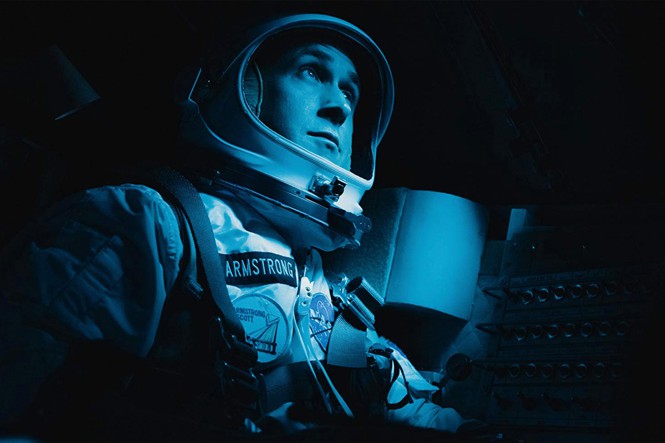
First Man (2018, directed by Damien Chazelle)
It’s obvious why it took so long to make a definitive film about Neil Armstrong, whom Ryan Gosling portrays in First Man. The astronaut was taciturn, nervy, and intensely private, and the stakes of the Apollo 11 mission, which every viewer knows will be a success, aren’t especially dramatic. But Chazelle’s brilliance comes from digging into how unknowable Armstrong was, even to his close friends and family, and how desperately tense so much of the Apollo program was despite its eventual triumph. First Man is stressful, often frustrating, and then deeply moving in its final act on the moon, which was particularly incredible to view on an IMAX screen.
A Quiet Passion (2016, directed by Terence Davies)
Terence Davies is kind of a specialist in biographical films about poets, which is to say he’s made two of them (the other, the Siegfried Sassoon–focused Benediction, is also worth a watch). His methodical storytelling approach is a perfect match for Emily Dickinson, whom Cynthia Nixon plays as much more complicated than her reputation as an inscrutable recluse. Davies portrays Dickinson’s slow withdrawal from public life over the years, starting with her time as a whip-smart teenager at a Christian boarding school, and moving on to her navigation of family drama and her challenges to the religious hegemony of the day. A Quiet Passion conveys the fractured, piercing nature of Dickinson’s poems, illustrating her creativity while avoiding clichéd scenes of her sitting at a desk pondering what line to write next.
Jackie (2016, directed by Pablo Larraín)
The Chilean filmmaker Larraín’s recent output has mostly concentrated on true stories; one of his best films, the Oscar-nominated No, dramatizes Chile’s national 1988 referendum on whether the Pinochet regime should stay in power. Of late, he’s moved on to portraits of powerful women that mix fact with imagination, including 2021’s divisive Spencer and an upcoming Maria Callas film starring Angelina Jolie. Jackie is the best example of his style: Natalie Portman portrays Jackie Kennedy in the immediate aftermath of her husband’s assassination in a film that explores the narrative she created about her family and the darker truths nested within it. Larraín’s mournful vision is meditative and at times nightmarish, but even the most abstract material is anchored by Portman’s self-aware, imposing performance.
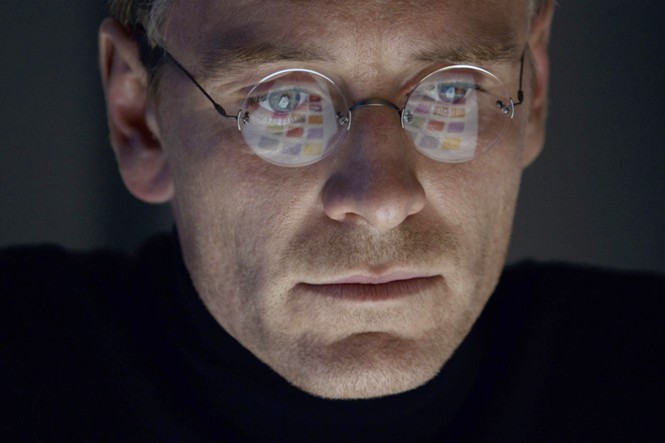
Steve Jobs (2015, directed by Danny Boyle)
Many biopics cleverly zero in on a specific moment in a subject’s life, picking a story that represents their wider impact on history. Steve Jobs, written by Aaron Sorkin and based on Walter Isaacson’s biography, adjusts that tendency by focusing on three major launches during the Apple founder’s life: the first Macintosh computer, his Apple rival NeXT, and the famed iMac. This brilliant meta-structure captures the boom-bust-rebound cycle so familiar to the tech world, and Sorkin’s gift for blending exposition with witty banter brings those action-packed segments to life. It’s an astounding portrayal of a figure whose charisma and prickliness existed side by side, with Michael Fassbender doing bravura work in the lead role.
Mr. Turner (2014, directed by Mike Leigh)
Mike Leigh has a particular creative process for his films, in which he improvises scenarios with his cast and builds out the story with them instead of writing a traditional screenplay. Many of his movies are more mundane slice-of-life dramas, but this approach works surprisingly well for biographical stories, lending a sense of authenticity to films such as Topsy-Turvy (about the musical-theater duo W. S. Gilbert and Arthur Sullivan) and Peterloo (about a notorious massacre of protesters in 1819 England). Mr. Turner might be my favorite of Leigh’s period biopics: It delves into the life and works of the brilliant but cantankerous artist J. M. W. Turner, whose impressionistic landscapes were decades ahead of their time and thus both celebrated and decried. Timothy Spall is wonderful and belligerent in the leading role, but the film is an unflinching look at life with an artist whose genius is inseparable from his personality flaws.
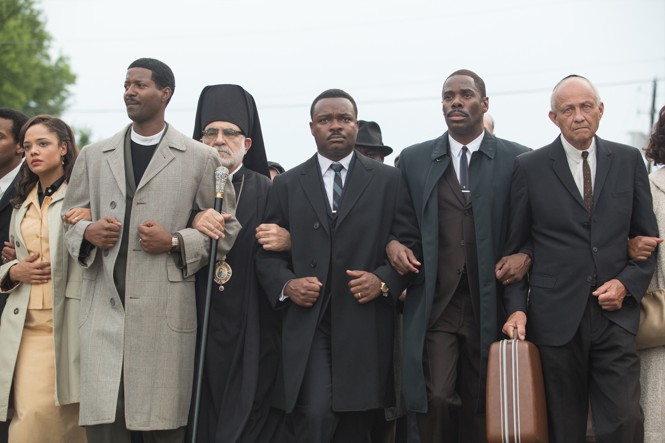
Selma (2014, directed by Ava DuVernay)
Selma, a thunderous historical drama that made DuVernay one of the most discussed directors of the decade, tackles a monumental subject with grace. The film depicts Martin Luther King Jr.’s role in organizing the Selma-to-Montgomery voting-rights marches of 1965. David Oyelowo is perfectly pitched in the lead role, capturing all of King’s charisma without overwhelming the ensemble. But Selma is also a story of community-based political progress, rendering the backroom meetings and widespread activism that laid the groundwork for the landmark protests. DuVernay’s camera remains intimate throughout, relying on close-ups to keep the real-life figures feeling, well, real, instead of like the formal portraits that viewers might know from their history books.
[Read: From Selma to Black Power]
The Wind Rises (2013, directed by Hayao Miyazaki)
As a historical narrative, The Wind Rises is only vaguely rooted in truth. Its protagonist, Jiro Horikoshi, was a real person, the designer of Japan’s Zero fighter planes and other aircraft used during World War II. But the story is partially fictionalized, blended with details from The Wind Has Risen, a novel about a man contending with his fiancée’s tuberculosis diagnosis. The great Japanese animator Miyazaki seems to insert this personal plotline as a way of imagining the kind of work-life conflict Jiro likely faced, torn between his calling and his home, a challenge Miyazaki himself has said he wrestled with. But the film is driven by an even knottier moral dilemma: the idea that one’s creations are being used for evil. Jiro’s passion for creating beautiful aircraft is equal only to his horror at the fact that his designs support machines of death and warfare. The Wind Rises is a knotty, spiritually conflicted work, and maybe the most complicated effort of Miyazaki’s storied career.
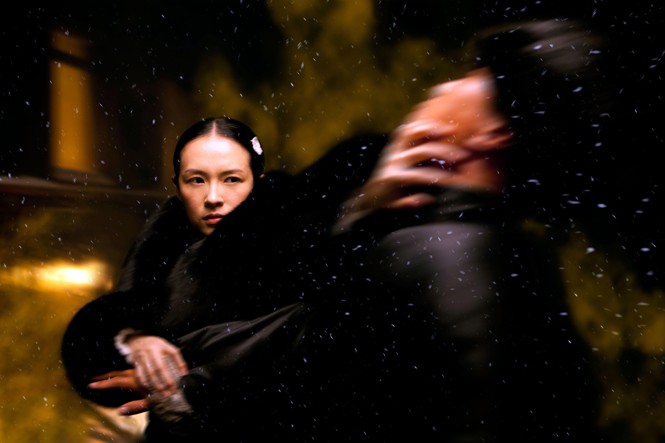
The Grandmaster (2013, directed by Wong Kar-wai)
The Grandmaster dramatizes the life of Ip Man, a revered martial artist who trained many future stars, most famously Bruce Lee. Directed by the leading Hong Kong filmmaker Wong Kar-wai, the film features the frequent Wong collaborator Tony Leung in the lead role and is steeped in both history and philosophy. The Grandmaster moves through Ip Man’s adolescence, early training years, marriage, and navigation of major events such as the Second Sino-Japanese War and the 1951 closing of the border between Hong Kong and mainland China. The film is a lavish production, and multiple versions have been released—including a very streamlined American cut that tries, clumsily, to provide further context for international viewers—but the 130-minute “Chinese Cut” is the one worth seeking out.
Bernie (2011, directed by Richard Linklater)
True crime is a subgenre that can be given to lurid controversy. But Linklater’s retelling of the 1996 murder of the Texas multimillionaire Marjorie Nugent (Shirley MacLaine) by her far younger companion, Bernie Tiede (Jack Black), is downright whimsical. There’s no mystery to the murder itself, which Tiede commits after his relationship with the unpleasant and demanding Nugent breaks down; Linklater is far more interested in the aftermath, when local townspeople start rallying to Tiede’s defense because of their hatred of his victim. Linklater places some of the real-life residents alongside professional actors, lending verisimilitude to the proceedings. Black gives one of the best performances of his career, bouncing off Matthew McConaughey, who plays a frustrated district attorney.
Moneyball (2011, directed by Bennett Miller)
Maybe the best sports movie of the 21st century is about an executive: Billy Beane (Brad Pitt), the general manager of the Oakland Athletics, who used advanced statistics to spin gold from one of the smallest budgets in Major League Baseball and stay ahead of his richer competitors. Adapted from Michael Lewis’s book about the team’s 2002 season, the film turns a data-driven quest into a war with the hard-bitten classicists of America’s pastime. It’s a compelling portrait of a divorced, aloof, intensely stubborn person who sometimes feels at odds with the sport he loves. Miller understands that the tension between change and tradition is what makes baseball such a uniquely American topic.
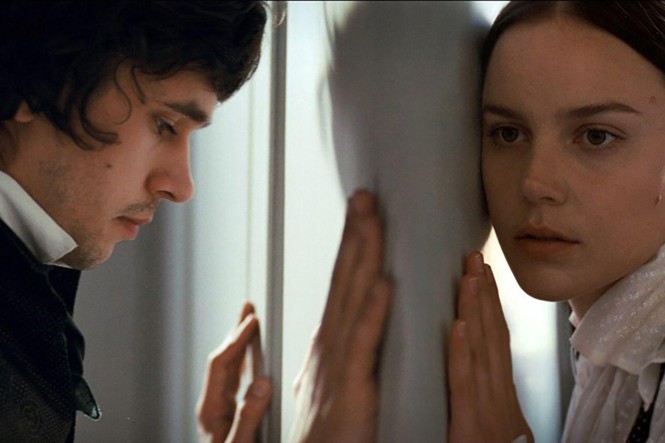
Bright Star (2009, directed by Jane Campion)
Like Terence Davies, Campion has directed multiple excellent biopics of poets and writers, and her 1990 film about Janet Frame, An Angel at My Table, warrants a look. But Bright Star might be her most singular work in a career filled with idiosyncratic triumphs. It tracks the last three years of the brief life of John Keats (Ben Whishaw), focusing on his romance with Fanny Brawne (Abbie Cornish), a woman who inspired some of his verse but whom he could not marry because of his lack of income. Bright Star is swooningly romantic and deeply tragic, steeped in Whishaw and Cornish’s natural chemistry and Keats’s connection to the natural world; it’s a heartbreaker of a film, but a worthy one.
I’m Not There (2007, directed by Todd Haynes)
While making a biographical movie about Bob Dylan, Todd Haynes seemed completely aware that the task before him—or at least any conventional approach—would be impossible. So he instead presents six short story lines that take on specific aspects of Dylan’s life or personality. Different actors (Christian Bale, Cate Blanchett, Marcus Carl Franklin, Richard Gere, Heath Ledger, and Ben Whishaw) portray the singer in some form or another. Blanchett’s performance as Dylan the mid-’60s folk rebel, spikily razzing the press about his switch to the electric guitar, is probably the best-remembered section. But Ledger’s work as Dylan around the time of his famed breakup album, Blood on the Tracks, is among the best of his sadly short career.
[Read: The rock band that redefined counterculture]
Marie Antoinette (2006, directed by Sofia Coppola)
For her follow-up to the Oscar winner Lost in Translation, Coppola tackled a difficult subject: the French queen Marie Antoinette (Kirsten Dunst), whose reign before the French Revolution was famed for its debauchery. Coppola’s take has a modern sheen, featuring a pop soundtrack and a cast of actors who mostly use their natural American accents. It’s also tinged with sympathy, noting the Austrian Marie’s alienation from her husband, Louis XVI (Jason Schwartzman), and from the strange French court she was shipped to at the age of 14. The film is so light and fizzy that it seems to almost forget how badly things will soon start to curdle—but the lack of self-awareness is, of course, part of the point.
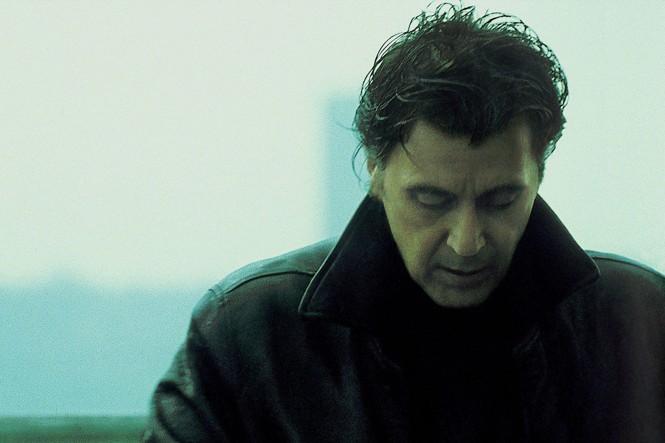
The Insider (1999, directed by Michael Mann)
Mann’s other biographical films are the fascinating yet challenging Ali (2001) and Public Enemies (2009), and he has another one, about the carmaker Enzo Ferrari, due out this year. But The Insider is probably the best biopic he’ll ever make. It fictionalizes the story of the whistleblower Jeffrey Wigand (Russell Crowe), who exposed a company’s secret efforts to make cigarettes more addictive. Al Pacino plays Lowell Bergman, the 60 Minutes producer trying to coax Wigand to make his claims public, and Mann gives their relationship operatic force, turning a story about good, hard journalism in drab offices into an entrancing visual marvel.
Nixon (1995, directed by Oliver Stone)
Stone has made many films about real-life figures, and his relationship to the truth has long been blurry at best. Alexander, his epic about the Macedonian conqueror, is his most formally daring work, but Nixon might be my personal favorite. Anthony Hopkins plays Richard Nixon in a film that takes a sweeping look at the disgraced president’s life and career. Though Stone is obviously politically opposed to Nixon, he seems to still feel deep sympathy for the complex, aggrieved outsider who struggled with personal demons and the grim circumstances of his impoverished youth. Nixon is also crammed with the kind of conspiratorial thinking about the U.S. government that suffuses many a Stone film, but that tone suits its protagonist, as he descends into paranoiac anger and the Watergate scandal erupts around him.
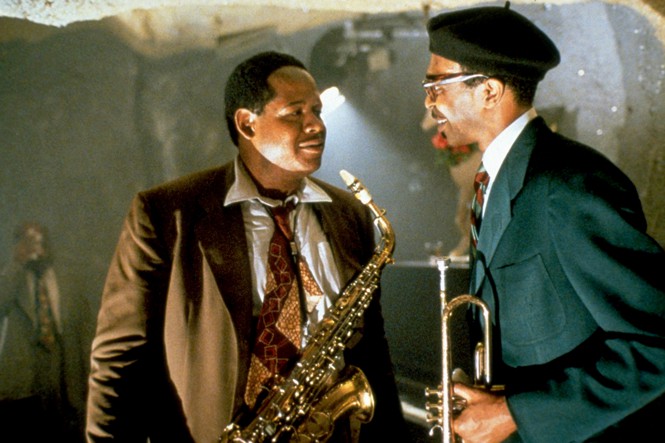
Bird (1988, directed by Clint Eastwood)
Eastwood has made several movies about real, ordinary folk who emerge as heroes, such as Sully and Richard Jewell. But his masterpiece of the biopic genre is Bird, an offbeat account of the life of the jazz saxophonist Charlie Parker (Forest Whitaker). Mimicking the improvisational structure of jazz, Bird is a montage that jumps forwards and backwards in Parker’s life. Across timelines, it’s most interested in his relationship with his wife, Chan (Diane Venora), and fellow musicians Dizzy Gillespie and Red Rodney. Whitaker’s performance is extraordinary, and Eastwood’s experimental approach is too.

